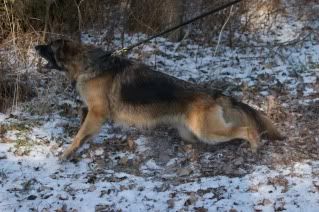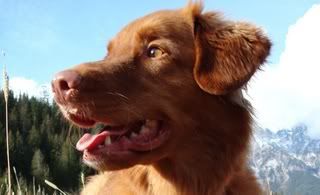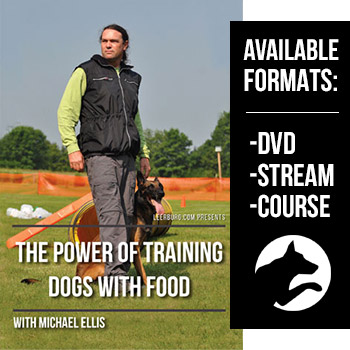 refueling during runs and bloat
#161348 - 11/06/2007 08:02 AM refueling during runs and bloat
#161348 - 11/06/2007 08:02 AM |
Webboard User
  
Reg: 08-16-2007
Posts: 2365
Loc: Toronto, Ontario, Canada
 Offline Offline |
|
i tried some searches, but no luck.
last night i did 21k w/luc (and 4.5k w/teagan, ooph), and realized that the distances are such where refueling during the run is generally necessary (at least for humans).
i didn't last night, but usually for somewhere between 20-25k+ i will take gel(s) (high-carb) along with me, it helps stop you from hitting the wall.
i don't know what to do for luc, or if he'll need it, do dogs process differently enough from humans that this isn't an issue? he's on a relatively low-carb diet (grain free kibble and raw) so i'm assuming he's operating without big glycogen stores to start with, but i don't know what replenishment he will need.
i was thinking of bringing along a chicken wing or something to give him at the mid-way point, maybe when he's getting some water. i have heard that dogs who eat raw do not get bloat - is this true? is it safe for me to give him something mid-run?
Teagan!
 |
 Top Top
|
 Re: refueling during runs and bloat
[Re: Jennifer Mullen ]
#161358 - 11/06/2007 09:01 AM Re: refueling during runs and bloat
[Re: Jennifer Mullen ]
#161358 - 11/06/2007 09:01 AM |
Webboard User
   
Reg: 04-02-2007
Posts: 749
Loc: Canada
 Offline Offline |
|
Jennifer,
As someone who often walks uphill all day in the summers for work with my dog I do not beleive that there is any need to feed your dog mid run.
I also bike 20+ km with my dog running/trotting, no big deal for them, provided they are worked up to it/conditioned. (it sounds as if you have done this with Luc and are doing in with Teagan)
Water should be provided of course. That said in these cooler temps my dog often chooses not to drink during a 20 km bike ride.
When I am hiking all day with the dog I will sometimes give him a peice of apple or some such thing when I have lunch, but not always. I do not notice a difference in energy levels either way.
If the dog is having days of high energy output, I feed my dog a little extra at his breakfast or dinner, so that he does not loose weight.
My dog is also raw fed. Raw fed dogs CAN indeed get bloat. Again, I beleive your dog needs nothing but water. (I do have this funny image of all the neighbourhood dogs following you as you run past, the smell of chicken wings wafting in their noses  )
Perhaps Connie can explain why dogs don't need sugars and starches the way we do for energy. I will do a lousy job!
|
 Top Top
|
 Re: refueling during runs and bloat
[Re: Jennifer Coulter ]
#161365 - 11/06/2007 09:28 AM Re: refueling during runs and bloat
[Re: Jennifer Coulter ]
#161365 - 11/06/2007 09:28 AM |
Webboard User
  
Reg: 08-16-2007
Posts: 2365
Loc: Toronto, Ontario, Canada
 Offline Offline |
|
well, i will say, he doesn't seem to have energy issues post-run (last night he was twirling and jumping in circles when we got back, he wanted to play tickling/wrestling....heh).
someone else found an article that said dogs get their energy from high-fat, and high-protein helps prevent exercise-induced anemia! so i think he's actually probably on an optimal diet, though i may introduce more fat into it (since he lost weight since i got him, i'm trying to get him to gain a couple of pounds anyways).
some stuff from the article:
Canine metabolism is unique. Mammalian muscle fibers have been classified into types I, IIa and IIb based on their metabolism. Type I fibers contain less ATPase activity compared with type II fibers. Types I and IIa are characterized by oxidative metabolism, whereas type IIb fibers are characterized by anaerobic glycolytic metabolism. Canine muscle contains mainly oxidative fibers (Armstrong et al. 1982, Gunn 1978a, Snow 1987). Guy and Snow (1981) describe some low oxidative muscle fibers in dogs but acknowledge that the activity of the oxidative enzyme succinate dehydrogenase in the low oxidative fibers was still greater than that in type IIb fibers from other species. Relative to metabolic body size, dogs also metabolize free fatty acids at twice the rate observed in humans (de Bruijne 1981). Dog muscle is, therefore, more adapted to use fat than human muscle and conclusions derived from human experiments may not be valid in dogs. In humans, the maximum rate of energy expenditure varies for each substrate, but the amount of substrate limits the length of time that this maximum rate of expenditure can be maintained (Hultman et al. 1994). Only creatine phosphate and ATP are able to sustain a 100-m sprint, but because stores are small, this high rate of energy expenditure can be maintained for only a few seconds. Carbohydrate oxidation supports the intermediate speed of marathon runners for 20 miles until all glycogen stores have been used; then, fat oxidation becomes the only source of available energy and runners are unable to accelerate, i.e., they "hit the wall." Stamina is limited by the amount of glycogen in muscle.
In humans, high carbohydrate diets increase stamina because they increase muscle glycogen (Hultman et al. 1994). In dogs, however, high fat/low carbohydrate diets increase stamina. Beagles ran for 20 miles (140 min) when fed high fat (53-67% of energy) diets but became exhausted after only 15 miles (100 min) when fed a moderate fat (29% of energy) diet (Downey et al. 1980). A high fat/high protein diet containing no carbohydrate resulted in better performance and less evidence of exertional rhabdomyolysis when fed to sled dogs (Kronfeld 1973). A high carbohydrate (59% of energy) low fat (16% of energy) diet fed to sled dogs resulted in higher resting muscle glycogen concentrations compared with a high fat (62% of energy), low carbohydrate (14% of energy) diet, but glycogen was used more rapidly during a race; thus the final muscle glycogen concentration was unchanged (Reynolds et al. 1996).
In dogs, as in other species, fat oxidation provides most of the energy at low rates of energy expenditure (60% at 40% of maximal oxygen uptake; VO2 max). As exercise intensity increases, glucose oxidation increases, whereas fat oxidation remains constant so that glucose oxidation is the principle source of energy at high rates of energy expenditure (80% at 85% VO2 max) (Weibel et al. 1996). In dogs, however, the amount of energy from fat oxidation at rest and during exercise is twice that in less aerobic species such as humans and goats (McLelland et al. 1994, Meyer and Doty 1988). Albumin binds more free fatty acids in dogs than in less aerobic species; thus the concentration of free fatty acids in the blood is higher and delivery of free fatty acids to the tissues is enhanced (McLelland et al. 1994). Muscle glycogen and fat stores are larger in dogs than in less aerobic species (Weibel et al. 1996). High fat diets increase resting serum triglycerides and free fatty acids, mitochondrial volume and maximal energy expenditure (Reynolds et al. 1996).
which is actually very interesting to me b/c humans are, as a species, designed for long-distance endeavours (i think it relates back to the idea that way back when, humans couldn't catch food by speed, but could wear/run it down over time). interesting that we've adapted to use different energy sources.
(full article is here: http://jn.nutrition.org/cgi/content/full/128/12/2686S)
i do give luc water, but not too much.
....now i'm wondering what is the maximum distance i could train my body to run without refueling. i've always just refueled as advised (more or less, i tend to go a bit further) for convenience.
Edited by Jennifer Mullen (11/06/2007 09:34 AM)
Edit reason: i don't give luc too much water....
Teagan!
 |
 Top Top
|
 Re: refueling during runs and bloat
[Re: Jennifer Mullen ]
#161394 - 11/06/2007 11:41 AM Re: refueling during runs and bloat
[Re: Jennifer Mullen ]
#161394 - 11/06/2007 11:41 AM |
Webboard User

   
Reg: 12-22-2006
Posts: 1824
Loc: Cambridge, MA
 Offline Offline |
|
Jennifer - are you a marathoner, or in training for something? You seem to be keeping a pretty amazing running log! 
That article clip was really interesting, thanks for sharing it! I've wondered the same thing at times as well - I run with my dog, and while we don't regularly do more than about 6 miles, we did do 13 miles last winter and while I definitely hit a wall at some point (with no food on me  ) , Oscar was raring to go the whole time - he even helped pull me up one last doozey of a hill! He's raw fed too, and I think his body just thrives on all the good protein and fat...
In additon to the nitty gritty nutrient absorption info in the text you quoted, the very fact that carnivores are designed to gorge on a big meal, then not eat for days at a time - even while tirelessly tracking and hunting new prey - is enough to make me think our dogs are just fine with no "snacks" during long days of activity (assuming, as Jennifer Coulter said, that the animal has been properly conditioned for the exercise at hand...). The bloat concern is a biggie for me as well, I have a large breed (and YES it can happen to raw fed dogs), so that's one more point in favor of leaving a nice meal, or any meal really, for AFTER the workout. 
~Natalya
|
 Top Top
|
 Re: refueling during runs and bloat
[Re: Jennifer Mullen ]
#161395 - 11/06/2007 11:54 AM Re: refueling during runs and bloat
[Re: Jennifer Mullen ]
#161395 - 11/06/2007 11:54 AM |
Webboard User

  
Reg: 08-06-2005
Posts: 615
Loc: San Diego, CA
 Offline Offline |
|
. . . i have heard that dogs who eat raw do not get bloat - is this true?
Yep, it's true. My healthy 8-yr-old GSD died several years ago from bloat. He had been raw fed for about 5 yrs. Vet had no idea what caused the bloat. I have my own theories, but neither of us thought it was diet or exercise/activity related.
Mike
Suppose you were an idiot.
Suppose you were a member of Congress.
But I repeat myself.
-Mark Twain |
 Top Top
|
 Re: refueling during runs and bloat
[Re: Natalya Zahn ]
#161399 - 11/06/2007 11:59 AM Re: refueling during runs and bloat
[Re: Natalya Zahn ]
#161399 - 11/06/2007 11:59 AM |
Webboard User
  
Reg: 08-16-2007
Posts: 2365
Loc: Toronto, Ontario, Canada
 Offline Offline |
|
yeah, i thought it was a great article!
i'm a marathoner, but i'm training for some ultramarathons. in the spring i'll do a couple, including a 78k race and a 100 mile race, but it's really in preparation for/to see if i can do the canadian death race (125k, 17,000 foot elevation change, in 24 hours, first weekend (long weekend) every august) (http://www.canadiandeathrace.com)
training runs w/luc will get up to 60k through the late winter, and will build from there but not by much. so it's those distances that are my big concern - as it turns out, i luckily tore a couple of ligaments in my ankle in the summer backpacking, so i'm having to build up distances slowly and luc can do them w/me. teagan is being kept to around 5k for now, though i will start to add in the odd 8k or 10k distance as she improves - i have seem SMALL improvements in her cardio fitness since i got her. anyways, so the big distances i worry about luc w/no fuel, but i agree - it seems like maybe the design of dogs is such that won't be an issue. and i'll watch him, he should be able to handle the distances from a building up point of view, but if he does hit the wall, i'll probably design the runs so that at some point i can go back past our house and drop him off, but hopefully that's not necessary.
(also, we don't normally do that kind of distance during the week, usually only on the weekend. but i felt awful on sunday so carried it over, usually we just do a 5k recovery run on mondays)
Teagan!
 |
 Top Top
|
 Re: refueling during runs and bloat
[Re: Jennifer Coulter ]
#161400 - 11/06/2007 12:00 PM Re: refueling during runs and bloat
[Re: Jennifer Coulter ]
#161400 - 11/06/2007 12:00 PM |
Moderator

   
Reg: 07-13-2005
Posts: 31580
Loc: North-Central coast of California
 Offline Offline |
|
.... explain why dogs don't need sugars and starches the way we do for energy. I will do a lousy job!
A dog's system uses fat for energy very much the way a human uses carbs.
|
 Top Top
|
 Re: refueling during runs and bloat
[Re: Mike Armstrong ]
#161401 - 11/06/2007 12:00 PM Re: refueling during runs and bloat
[Re: Mike Armstrong ]
#161401 - 11/06/2007 12:00 PM |
Webboard User
  
Reg: 08-16-2007
Posts: 2365
Loc: Toronto, Ontario, Canada
 Offline Offline |
|
. . . i have heard that dogs who eat raw do not get bloat - is this true?
Yep, it's true. My healthy 8-yr-old GSD died several years ago from bloat. He had been raw fed for about 5 yrs. Vet had no idea what caused the bloat. I have my own theories, but neither of us thought it was diet or exercise/activity related.
Mike
that's sad. i think no matter what, i'm going to approach exercise and feeding careful to eliminate some risk, but i guess nothing is ever 100%.
Teagan!
 |
 Top Top
|
 Re: refueling during runs and bloat
[Re: Connie Sutherland ]
#161404 - 11/06/2007 12:09 PM Re: refueling during runs and bloat
[Re: Connie Sutherland ]
#161404 - 11/06/2007 12:09 PM |
Moderator

   
Reg: 07-13-2005
Posts: 31580
Loc: North-Central coast of California
 Offline Offline |
|
P.S. on the carb/energy question:
http://www.doglogic.com/b2bfat.htm
Also, in humans, high carbohydrate diets increase stamina because they increase muscle glycogen (Hultman et al. 1994). In dogs, however, high fat/low carbohydrate diets increase stamina. Beagles ran for 20 miles (140 min) when fed high fat (53-67% of energy) diets but became exhausted after only 15 miles (100 min) when fed a moderate fat (29% of energy) diet (Downey et al. 1980). A high fat/high protein diet containing no carbohydrate resulted in better performance and less evidence of exertional rhabdomyolysis when fed to sled dogs (Kronfeld 1973). END
BTW, I am never referring to cooked fat. I am always referring to raw fats (and oils).
|
 Top Top
|
 Re: refueling during runs and bloat
[Re: Connie Sutherland ]
#161411 - 11/06/2007 12:17 PM Re: refueling during runs and bloat
[Re: Connie Sutherland ]
#161411 - 11/06/2007 12:17 PM |
Webboard User
  
Reg: 08-16-2007
Posts: 2365
Loc: Toronto, Ontario, Canada
 Offline Offline |
|
i must admit, i'm pretty pleased both dogs are on basically an optimal diet for this. i'm feeding it b/c it's healthier; while it makes sense it would then also be best for stamina, i'm so used to thinking of things from a carbs point of view that never occured to me.
i'm going to add in some more raw fats though, absolutely.
Teagan!
 |
 Top Top
|
When purchasing any product from Leerburg Enterprises, Inc. it is understood
that any and all products sold by Leerburg Enterprises, Inc. are sold in Dunn
County Wisconsin, USA. Any and all legal action taken against Leerburg Enterprises,
Inc. concerning the purchase or use of these products must take place in Dunn
County, Wisconsin. If customers do not agree with this policy they should not
purchase Leerburg Ent. Inc. products.
Dog Training is never without risk of injury. Do not use any of the products
sold by Leerburg Enterprises, Inc. without consulting a local professional.
The training methods shown in the Leerburg Ent. Inc. DVD’s are meant
to be used with a local instructor or trainer. Leerburg Enterprises, Inc. cannot
be held responsible for accidents or injuries to humans and/or animals.
Copyright 2010 Leerburg® Enterprises, Inc. All rights reserved. All photos and content on leerburg.com are part of a registered copyright owned by Leerburg Enterprise, Inc.
By accessing any information within Leerburg.com, you agree to abide by the
Leerburg.com Privacy Policy and Terms of Use.
 Previous Topic
Previous Topic Index
Index Next Topic
Next Topic













 Top
Top )
)

 ) , Oscar was raring to go the whole time - he even helped pull me up one last doozey of a hill! He's raw fed too, and I think his body just thrives on all the good protein and fat...
) , Oscar was raring to go the whole time - he even helped pull me up one last doozey of a hill! He's raw fed too, and I think his body just thrives on all the good protein and fat...

.jpg)
.jpg)
